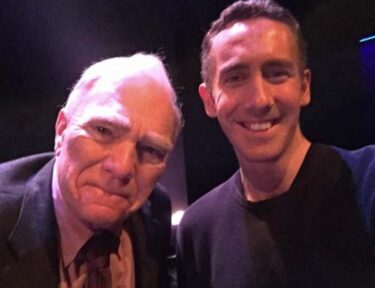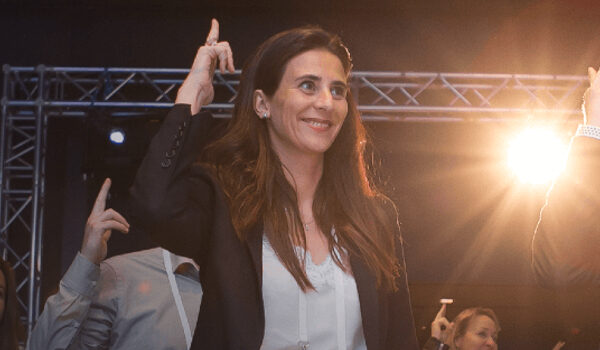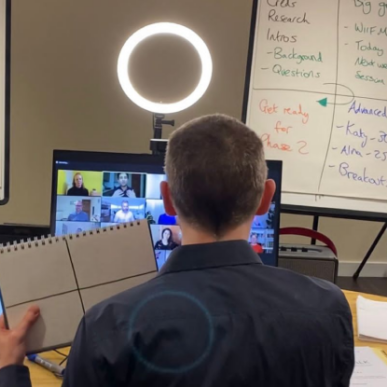When it comes to storytelling experts, few names resonate as much as Robert McKee, often heralded as the ‘Godfather of Storytelling.’
His students have built an impressive tally of 60 Academy Awards and 170 Emmys, including cinematic greats like Erin Brockovich and Forrest Gump. But this isn’t just Hollywood magic; McKee’s story artistry is a potent recipe for real-world business success.
Imagine this: a construction company’s turnover soaring from $1 billion to $2 billion in just 12 months, all thanks to crafting compelling narratives for their pitches with ideas inspired by Mckee.
We’ve had the privilege of two illuminating interviews with Robert at Body Talk, unearthing the power of storytelling in business. The blog below looks at five of the key insights he shared with us.
Interruption Selling No Longer Works
In today’s era of endless distractions – messages, emails, social media, smart devices – the old ‘interruption selling’ strategy becomes a little wobbly. The idea that facts alone can change our minds crumbles upon examination. It’s our job to weave facts into narratives that resonate and captivate. The idea of an ‘elevator pitch’ has existed since the 1970s. But it’s no longer enough just to get a quick word in – we need to tell stories that make people laugh, cry and feel engaged. And those stories need to be all about the audience. It doesn’t matter how amazing you think your product or service is – if you don’t speak to their pain points and desires, the story won’t stick.
Use Purpose-Told Stories
At the heart of purpose-told stories lies the principle of starting with “why,” a concept created by Simon Sinek. He discusses the significance of clarifying the purpose or cause behind any endeavour before delving into the “how” and “what.”
This principle, famously known as the “Golden Circle,” explains that individuals and organisations can create narratives that resonate deeply with their audience by focusing on why something matters.
Sinek says that purpose-told stories go beyond day-to-day business transactions. When people connect with the underlying purpose of a story, they become emotionally invested and form lasting connections. Brands that communicate their values, mission, and beliefs through purpose-driven narratives are more likely to inspire customer loyalty and trust.
Differentiate your Business with Storytelling
In a crowded market, differentiation hinges on storytelling. It’s not just about expertise; it’s about the stories woven around you or your brand. Stories offer a unique way to etch a memorable identity.
In a poll created by Sprout Social, when customers feel connected to brands, more than half of consumers (57%) will increase their spending with that brand, and 76% will buy from them over a competitor.
Storytelling has the power to move people and create lasting connections. It’s a core part of our human nature; we don’t just remember facts; we remember stories that transform those facts into something greater than the sum of its parts.
Bolt, a construction company, used to win around 1 in 10 of their bids for work. Much of their pitch involved telling prospective clients facts and hoping that would be enough. Since adopting a story-telling culture, they are now winning five times as many pitches by delivering the same facts in a more engaging way.
Be Human
Many people think ‘the facts will speak for themselves’. They won’t. Facts are not truth. They are neutral and meaningless without emotion to give them context. We can’t just feed our audience a diet of dry facts; they need something more substantial to get behind – an emotionally engaging story. The heart of storytelling in business presentations lies in understanding what resonates with your audience. They need to feel something from the facts – be moved and inspired in a way that facts alone can’t do.
We can also switch from scientific presentations to humanistic ones. While data and scientific insights undoubtedly play a crucial role in shaping our understanding of the world, the true magic lies in translating these raw numbers and facts into narratives that resonate with our emotions and aspirations. Think of it as a journey from the realm of cold statistics to the warm embrace of relatable stories. This transition doesn’t diminish the importance of data; instead, it elevates it by infusing it with context and significance. Big brands such as Air BnB and Spotify have used their data to create compelling stories that connect with their audiences.
Create a Storytelling Culture
Stories are also critical in your team meetings. If you want to inspire, lead and motivate people, they don’t want data; they want a vision. After all, there are no facts about the future, just a selection of stories about what the data means. Imagine if every member of your team and every one of your clients had a compelling story about why they worked with you. Not just a reason but a story that engaged them logically and emotionally.
Great stories will hook our attention, hold it and compel us to act. Can you say the same for most PowerPoint presentations? It is estimated that around £8 billion is wasted each year in the UK on paying for the time it takes people to create slides. Very little of that information is retained, understood, or acted on.
At Amazon, slides are forbidden. People bring stories to their meetings to ensure everyone fully understands and remembers what is happening in their business.
In a world inundated with information and fleeting attention spans, Robert McKee’s insights into storytelling stand as guiding lights in Hollywood and the business world.
His principles are key to forging genuine connections, spurring innovation, and leaving a lasting mark. As we navigate an era of increasing distractions, the power of storytelling becomes clear – it’s not the facts themselves, but the emotions they carry that hold weight.
Storytelling is indispensable for setting a business apart, motivating teams, and establishing a strong identity. By embracing purpose-driven stories, relatable presentations, and a storytelling culture, businesses can wield a powerful narrative to connect, engage, and inspire.
Stories are the threads shaping the future, and McKee’s wisdom serves as a guiding light, ensuring these threads form a meaningful tapestry.
Check out our podcast with Robert McKee below, you can also listen on Apple or Spotify. Plus, watch my face-to-face interview with Robert on our You Tube Channel.





















